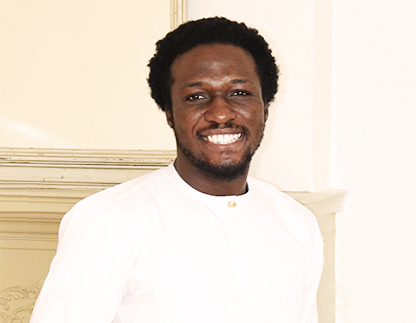Although success in research (or life) is not guaranteed, the journey is still well worth taking, for others may complete what I have started, and I live on through them.”
Adetoye Adekoya
PhD Candidate in the Department of Materials Science and Engineering

Adetoye Adekoya is a PhD candidate in the Department of Materials Science and Engineering in the McCormick School of Engineering. His research utilizes computational tools like Density Functional Theory (DFT) and Calculation of Phase Diagrams (CALPHAD) to better understand and improve engineered semiconductors. The semiconductors are used in thermoelectric devices for recapturing and converting heat to electricity in both terrestrial and extraterrestrial environments. Adetoye was awarded a Predictive Science and Engineering Cluster Fellowship in 2021.
How would you describe your research and/or work to a non-academic audience?
I study thermoelectric materials, which can convert heat gradients to electricity, and use various modeling techniques to determine how to improve and manufacture them. My work utilizes a combination of empirical modeling, first-principle calculations, and experiments, supplementing one with the other to create models that can holistically describe the thermodynamics of materials.
What have been some of the most memorable twists and turns of your career?
I had always thought I would work in the automobile industry as a mechanical engineer. However, the narrative changed when I had the opportunity to work on a materials-related project (i.e., improving the properties of aluminum alloys by compositing with low-cost wastes such as rice husk ash and eggshell ash). My somewhat sudden decision to switch from mechanical engineering to materials science and engineering is the most memorable twist in my career so far.
Tell us what inspired your research and/or work.
Engineers have learned how to harness the laws of thermodynamics to create powerful engines, rockets, and vehicles that go far into space. As a kid, I was always fascinated by these engines and the scientific knowledge behind them. Thermoelectric devices can create electricity from waste heat, and my work allows me to study them from a thermodynamic point of view, preserving my dreams of the future while retaining my childhood desires.
Whom do you admire in your field and otherwise, and why?
Dr. Carolyn R. Duran, a VP at Intel and adjunct professor at Northwestern. I admire her approach to life and work. I am particularly interested in her career path since she received her PhD from Northwestern, and she is a good example of the opportunities available within my field post-graduation.
What do you find both rewarding and challenging about your research and/or work?
My research is a relatively unexplored attempt to combine the fields of CALPHAD and thermoelectrics. As a result, helpful discussions can be scarce and existing literature must be questioned. However, it is exciting to have the opportunity to present something new to two established fields.
What is the biggest potential impact or implication of your work?
My work can help make better thermoelectric materials, which means cleaner energy. Thermoelectric materials provide an alternative source of energy that also utilizes waste heat from other energy sources/manufacturing plants, making our energy usage more efficient—thus a win for the earth and mankind.
Why Northwestern?
Northwestern’s Department of Materials Science and Engineering is the world's oldest and consistently ranked in the top two. The proximity to Lake Michigan, the brilliance of my colleagues, and the amazing professors all made it a no-brainer. I also think Evanston is such a beautiful town.
How do you unwind after a long day?
I like to hit the gym, relax with a novel, and catch up with my friends around the world.
What books are on your bedside table?
I always have my Bible, my jotter, and a textbook on CALPHAD. Some other books cycle in and out. Currently, I have a copy of The Beautyful Ones Are Not Yet Born by Ayi Kwei Armah and The Myth of Sisyphus by Albert Camus.
What inspires you?
A quote from one of my favorite books, Toll the Hounds by Steven Erikson: “There is no struggle too vast, no odds too overwhelming, for even should we fail—should we fall—we will know that we have lived.” It reminds me that although success in research (or life) is not guaranteed, the journey is still well worth taking, for others may complete what I have started, and I live on through them.
What did you originally want to be when you grew up?
Growing up in Nigeria, I was always fascinated by cars, engines, and power plants. Right from the time I was old enough to answer that question, my response was always “an engineer,” specifically a mechanical engineer. I’ve come a long way from there, but I still consider myself to be a mechanical engineer.
Published: April 25, 2023
If you know a graduate student, postdoctoral trainee, graduate faculty member, staff member, or a member of our TGS alumni population who would make a great candidate for our TGS Spotlight Series, please complete this brief TGS Spotlight Series Nomination Form.